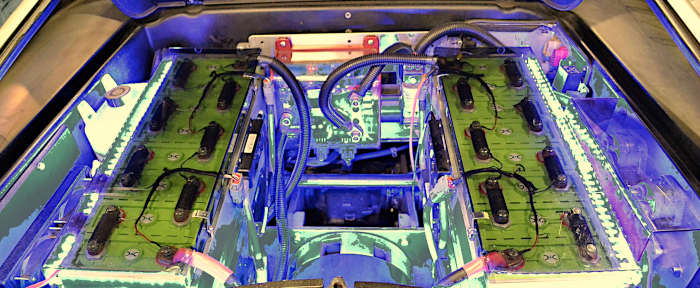Advanced level English - technical
With interactive worksheetGovernments
and motor manufacturers around the world are throwing money and
resources into the development of electric vehicles. But
can electric
power really replace the internal
combustion engine before the middle of the century? Maybe
it can, but this is by no means certain.

Electric car batteries - big, heavy and hard to exchange
Words in red are explained in the vocabulary guide; words in blue or green appear in the worksheet below.
Electric vehicles have arrived. With technology led by Tesla, and all of the world's major car manufacturers following along behind, electric vehicles are now a common sight on the roads of most developed countries. Yet the situation in less developed countries is rather different; the only African country to have started the change to electric vehicles is South Africa and even there, electric vehicle sales still account for less than 1% of the total. In South America, the situation is better, with all Latin American countries beginning the move towards electric vehicles, particularly Columbia which, in 2020, had a third of the continent's total electric car fleet.. In Russia, the wealthy were investing in imported electric cars until the invasion of Ukraine stopped most imports; a very small number of electric vehicles are manufactured locally. In India the government is promoting the purchase of electric vehicles with tax exemptions and other incentives. So electric cars have arrived, and their share of the market is increasing almost worldwide.
Books from Linguapress

The massive development of electric vehicles can only be possible if two conditions are met. Firstly the expansion of electric vehicle manufacturing is dependent on the fragile ability of manufacturers to source vastly increased quantities of vital components and elements without which electric vehicles cannot operate; these include lithium, cobalt and "rare earths" such as neodymium and tantalum, as well as silicon chips which have already been in short supply since 2020. Secondly, few countries currently have electricity grids that are anywhere near being able to cope with the huge increase in demand for electricity that will accompany any rapid growth in electric vehicle ownership. Without adequate supplies of all the vital ingredients of electric motors and batteries, or without power supplies that are able to provide the electricity required to recharge millions of electric batteries every day (as well as supplying the current we need for everything else, such as lighting, heating, trains and electric devices), the electric car revolution will run up against insoluble problems in all but the most developed countries.
Governments and vehicle manufacturers are fully aware of these issues, but the consensus among policy-makers seems to be that somehow technology will come up with the answers, as it often has in the past. Analysts also predict that changing social attitudes and environmental awareness will lead to a reduction in private vehicle use and a fall in the numbers of vehicles on the roads. This prediction is likely to be right, though not necessarily for those reasons alone; any shortage of essential components will force up the cost of electric vehicles, and any shortage of battery recharging facilities or capacity will discourage people from buying electric vehicles, leading to a fall in the number of vehicles on the roads.
Ultimately the success of the transition to electric powered vehicles will depend on advances in technology in three fields; the weight of batteries, the amount of power that they can produce, and the speed at which they can be recharged... or exchanged.
It may surprise you to learn that electric vehicles are not a new idea; indeed, at the start of the automobile age in the late 19th century, America had as many electric cars as gas-driven cars, and New York's biggest taxi company used electric vehicles. In order to keep their taxis on the road when the batteries ran low, they set up battery points at strategic locations where instead of recharging their batteries, drivers would just exchange them for fully recharged ones, a process that took no longer than refilling with gasolene.
Thus battery exchange stations, rather than battery recharging points, may perhaps solve the problem of slow recharging times which currently prevents owners taking their electric vehicles on long trips. Yet battery exchange is not an option with today's large heavy batteries. While the latest generation of Lithium-ion batteries are almost twice as efficient as the batteries being used just five years ago, they remain big and heavy. Before batteries can become easy to exchange, a in battery technology is needed, one which will allow batteries to store much larger amounts of electricity in much smaller and lighter units. Teams of top electrical engineers in universities and private laboratories worldwide are working on battery technology, and progress has been rapid.... New types of lithium batteries are being developed, but the radical discovery that will revolutionise battery design is still to be made.
As for the availability of clean renewable electricity in sufficient quantities to cope with demand from all the world's electric vehicles, progress in this direction is already underway. Ideally, notably in hot countries and outside cities, recharging points will be autonomous, generating their own electricity from solar panels and wind or water turbines and storing it either mechanically or in high-powered batteries. The technology already exists, and a California company, Beam Global, recently installed 30 solar-powered recharging stations in sunny parts of the state.
So are people who believe in the ability of technology to solve all our problems being realistic, or over-optimistic? And will other problems such as environmental issues and the availability of vital materials throw a spanner in the works? Will all the world's countries be able to complete the electric vehicle revolution, or will the world's poorer nations get left behind.... yet again? For the time being, progress is upwards, but can it continue? In terms of volume, the electric vehicle revolution has only just got underway..
WORDS :
vehicle pronounced ['viə-kul] - car, truck, van etc. internal combustion engine: the petrol (gas) engine used in cars and trucks - fleet: the total number of cars - manufacture (verb) : to make, to produce - exemption: dispensation, authorisation to not do something - incentive: encouragement, something to make someone want something - is on track to : is going fast enough to - sustainable: permanent and not bad for the environment - grid: network - power: electricity or other sources of energy - device: machine, apparatus - gas, gasolene (American) : petrol (British): quantum leap: a radical new development - underway: started, in progress.
Copyright © Linguapress. Do not copy this document to any other website
Copying permitted for personal study, or by teachers for use with their students
STUDENTS' interactive WORKSHEET
The electric car revolution
To save your answers, take a screenshot of a completed area and paste it into a word processing file or email or other document, or select and print.1. Multiple-choice cloze exercise. Undertanding the text.
Choose the nearest equivalent of each of the following expressions: click down arrow and select the correct answer.
- Account for: a) pay for b) form c) are under
- The purchase of : a) the buying of b) the modification of c) the following of
- Phase out : a) increase b) slowly start c) gradually end
- Been in short supply.. : a) been hard to find b) been easy to find c) been smaller
- Supplies : a) sales b) quantities c) orders
- To run up against : a) go faster than b) be helped by c) be hindered by
- Shortage : a) reduction b) insufficient quantity c) acceleration
- Got underway : a) begun b) finished c) slowed down
- sight
- the wealthy
- components
- are fully aware of
- to cope with demand
- slow recharging
times
- throw a spanner in the works
Classroom or individual exercises. Guidance for teachers.
DISCUSSION:
Free expression (written or oral): This article provides plenty of information that can allow students to discuss the future of electric cars. Is it really realistic to imagine that we will all be driving electric vehicles by the middle of the century, or is this an example of vastly overoptimistic predictions by governments and the car lobby, faced with the increasing public awareness of the dangers of climate change?
Do decision makers in the developed countries really understand how the world's poorer countries will or will not be able to embrace the electric vehicle revolution?
This article does not touch on other points that may be significant, notably the geopolitical issues that will arise from sourcing vital elements and rare earths from some of the world's poorer countries, and countries with poor human rights records. Or sourcing them from deep-sea mining... another potentially explosive proposal.
Nor does it mention other alternatives, such as hydrogen fuel-cells which also have the potential ability to power sustainable vehicles in the decades to come. The problems with hydrogen fuel cells are greater than with electric power, since most current hydrogen fuel cells use hydrogen generated by a process called steam-methane reforming (grey hydrogen or blue hydrogen), which uses a lot of energy and also requires the use of methane gas. Researchers are now suggesting that the only sustainable hydrogen is actualy "green hydrogen", requiring the electrolysis of water powered by renewable energy.
This topic should be able to generate plenty of lively discussion in classes where students are at least partly aware of the issues.
Working backwards: oral pair work.
Imagine that this article was written following an interview in which a journalist talked to an electric vehicle expert. Recreate the interview.
Teachers
section : Using this article in class.
Technical language:
Although this is a technical text using the language and style of technical writing, it is not a text that requires specialist technical knowledge. This is a technical text for advanced students whether they are technically minded or not. The subject is one that concerns everyone. This is good document to use with students preparing for TOEFL or TOEIC qualifications.Vocabulary:
In terms of vocabulary, this text is very rich, with its idiomatic expressions, phrasal verbs, and broad range of useful vocabulary. Some of the vocabulary is explained in the word guide, other words and phrases are taken up in the exercises above, others are not explained, but their meaning can be deduced from the context through logical reading.Expression: to throw a spanner in the works is a British English idiom; the American equivalent is to throw a wrench in the works.
Grammar: nouns:
Technical language is characterised by the regular use of verbal nouns in greater quantity than in everyday language.This article contains a significant number of verbal nouns that are identical (in spelling at least) to the verbs themselves. You might ask students to find ten of these; they will include move, change, purchase, needs, supply, increase, demand, use, fall, advance, start, progress, design
Pay attention to all the verbal nouns used in this article, and in particular to the endings, as in development, expansion, growth, lighting, heating, analysts, transition, discovery.
For more general ideas about using a technical article like this in class, see the Linguapress general guide to working with technical texts in the English class.
© texts linguapress.com
Photo top of page by Linguapress.
other photo by Artistic Operations. Licence Pixabay





 Copyright
information.
Copyright
information.